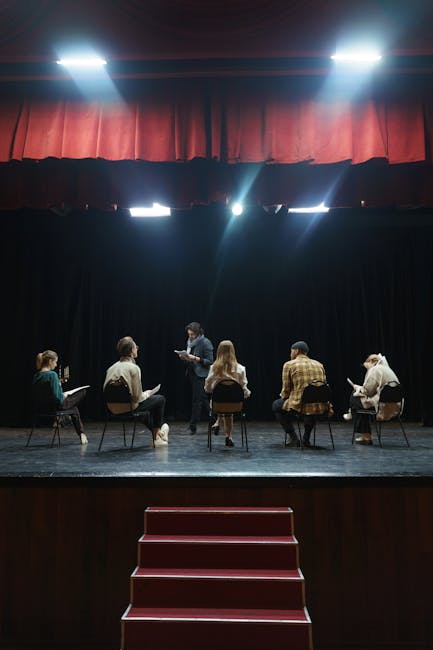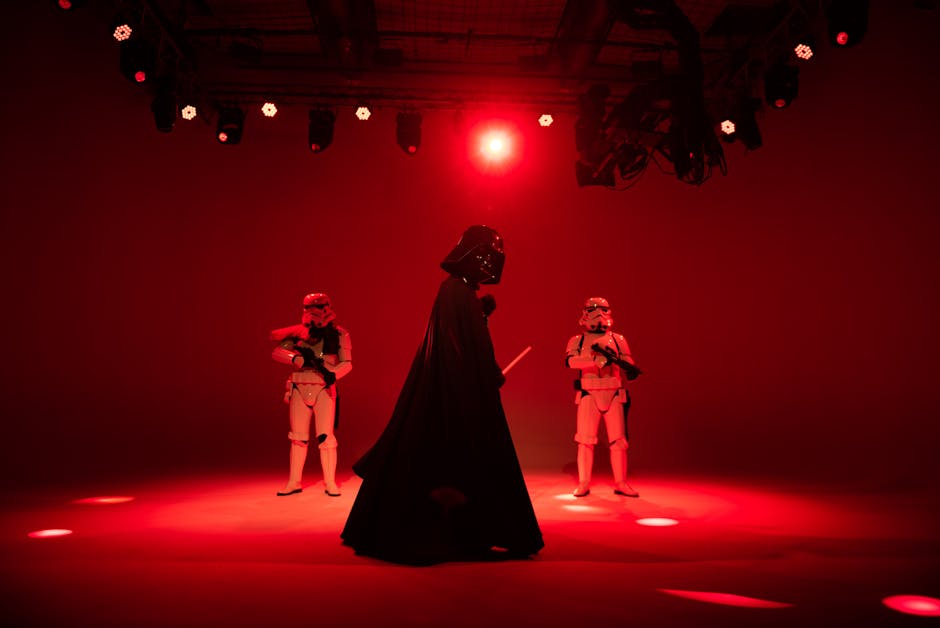Lights, camera, action! Hollywood is known for creating magic on the big screen, but behind the scenes, there can be some drama-worthy divides. From feuds between co-stars to directors clashing with producers, the entertainment industry is no stranger to conflict. However, amidst all the chaos, there are some rare gems that manage to bridge the divides and form strong relationships that shine both on stage and on screen. Let’s take a closer look at these dynamic duos who prove that teamwork truly makes the dream work in Tinseltown.
acting“>Key Differences Between Stage and Screen Acting
When it comes to acting, whether it’s on stage or on screen, there are some key differences that set the two apart. Let’s take a closer look at these differences in a more entertaining way:
One major difference between stage and screen acting is the size of the performance. On stage, actors need to project their voices and gestures to reach the back of the theater. This often leads to exaggerated expressions and movements. On the other hand, screen acting requires a much more subtle approach. A raised eyebrow or a slight smile can convey a world of emotion on camera.
Another key difference is the element of time. In stage acting, actors need to maintain their energy and focus for the entire duration of the performance, which can last for hours. On screen, scenes are often shot out of order, requiring actors to switch emotions and actions at the drop of a hat. It’s like a game of emotional hopscotch!
Lastly, the relationship with the audience is vastly different between stage and screen acting. On stage, actors can feel the immediate feedback from the audience’s reactions, whether it’s laughter, applause, or even silence. In contrast, screen actors may never meet their audience in person and have to rely on reviews and ratings to gauge their performance. It’s like performing in a vacuum, hoping that someone, somewhere, is watching.

The Challenges of Transitioning Between Stage and Screen
So you’ve conquered the stage and now you’re ready to take on the world of screen acting. While it may seem like a seamless transition, there are some challenges that you might face along the way. Here are a few things to keep in mind:
- Volume Control: On stage, you have to project your voice to the back of the auditorium. On screen, a whisper can be heard loud and clear. Avoid blowing out the sound system with your booming stage voice.
- Facial Expressions: When performing on stage, you have to exaggerate your facial expressions so that the audience can see your emotions. On screen, subtlety is key. Try not to make your expressions so big that they can be seen from space.
Another challenge actors face when transitioning between stage and screen is
- Timing: On stage, you have to stick to a strict schedule and hit your marks in order to ensure the show runs smoothly. On screen, there are endless takes and plenty of time for retakes. Don’t stress about nailing it on the first try.
- Physicality: On stage, you have to use your entire body to convey emotion and movement. On screen, the camera can pick up the smallest gestures. Remember, less is more.

Techniques for Building Relationships with Co-Stars on Stage
So you’ve landed a role in a play and now it’s time to build relationships with your co-stars on stage. Don’t worry, we’ve got you covered with some hilarious techniques to help you bond with your fellow actors:
- Game of Trust Falls: Instead of the traditional trust fall exercise, why not spice it up a bit and play a game of trust falls with your co-stars? Nothing builds trust like catching your co-star mid-fall and then laughing about it afterwards!
- Improv Icebreakers: Break the ice with your co-stars by playing some improv games. Whether it’s a game of “Yes, and…” or “Who’s Line Is It Anyway?”, improv is a great way to get to know your fellow actors in a fun and hilarious way.
- Prop Swap: Have a prop in the play that you’re particularly attached to? Well, it’s time to let go and swap props with your co-star. This silly exercise will not only help you bond with your fellow actor, but it will also give you a new perspective on your character and the play.
Remember, building relationships with your co-stars is essential for creating a strong and dynamic performance on stage. So don’t be afraid to get a little goofy and have some fun with these techniques!

Navigating the Dynamics of On-Screen Chemistry
So you’ve found yourself in the world of on-screen chemistry, trying to make sparks fly with your co-star. It’s like trying to dance the tango blindfolded - exhilarating, nerve-wracking, and potentially disastrous. But fear not! With a few tips and tricks, you can navigate these choppy waters like a seasoned sailor.
First and foremost, remember that on-screen chemistry is all about creating a believable connection with your co-star. It’s not about forcing chemistry where there is none (trust me, audiences can smell that a mile away). Instead, focus on building a rapport and finding common ground. Maybe you both share a love for cats or have a secret talent for juggling – these shared interests can help create a real bond on screen.
Another key aspect of on-screen chemistry is physicality. No, I’m not talking about locking lips or holding hands (although those are important too). I’m talking about body language - the subtle cues that can speak volumes without saying a word. Lean in when your co-star is speaking, maintain eye contact, and mirror their movements. Before you know it, you’ll be in sync like a well-oiled machine.
And last but not least, don’t forget to have fun! Acting is supposed to be enjoyable, so don’t get bogged down by the pressure of creating on-screen chemistry. Embrace the awkward moments, laugh at your mistakes, and just go with the flow. Who knows, you might just stumble upon that elusive spark that will light up the screen!

How Stage Rehearsals Impact Character Dynamics on Screen
Have you ever wondered how those intense character dynamics on screen come to life? Well, let me tell you, it’s all thanks to the magical world of stage rehearsals!
During stage rehearsals, actors have the opportunity to really dive into their characters and develop their relationships in ways that just can’t be replicated on a film set. They get to explore their characters’ motivations, emotions, and quirks in a safe and collaborative environment, which ultimately translates into the on-screen chemistry we all know and love.
Plus, let’s not forget about the power of the ensemble! When actors work together day in and day out during rehearsals, they form a tight-knit bond that shines through on screen. It’s like they develop their own secret language and inside jokes that only they understand, adding an extra layer of depth to their performances.
So, next time you’re watching a movie or TV show and you’re blown away by the chemistry between the characters, just remember that it all started with those grueling, yet oh-so-important stage rehearsals. It’s where the magic happens, folks!
Building Trust and Chemistry with Co-Stars in the Entertainment Industry
When it comes to building trust and chemistry with your co-stars in the entertainment industry, it’s all about finding common ground and forming a strong bond. Here are some tips to help you navigate the sometimes rocky waters of on-set relationships:
- Communication is key: Make sure to communicate openly and honestly with your co-stars. Whether it’s discussing your acting choices or sharing your favorite snack, open communication can help you build a solid foundation for your working relationship.
- Find ways to bond: Whether it’s through a shared love of cheesy ’80s movies or a mutual hatred of early morning call times, finding common ground with your co-stars can help break the ice and forge a connection that will shine through on screen.
- Don’t take yourself too seriously: In the high-pressure world of entertainment, it’s important to remember to have fun. Making your co-stars laugh, pulling pranks on set, or just bringing a positive attitude can go a long way in building trust and chemistry with your fellow actors.
At the end of the day, trust and chemistry with your co-stars can make or break a project. By following these tips and approaching each new opportunity with an open mind and a sense of humor, you’ll be well on your way to building strong, lasting relationships with your on-screen companions.
FAQs
What tips do you have for transitioning a stage performance to the big screen?
Well, the first thing you have to remember is that on stage, we overact like there’s no tomorrow. But in front of the camera, a raised eyebrow can speak volumes. So, dial it back and let the camera do the work for you. Also, work on your eye acting – the camera loves intense stares.
How can actors maintain chemistry with their scene partner when moving from stage to screen?
Chemistry is key, darling! To keep that spark alive, practice makes perfect. Spend time with your scene partner off set, get to know each other’s quirks and pet peeves. Plus, never underestimate the power of a good old-fashioned trust fall to really solidify that bond.
What are some common mistakes actors make when transitioning between stage and screen roles?
One big mistake is forgetting that the camera picks up everything – and I mean everything. So, be sure to watch your facial expressions and body language. Also, enunciating every syllable like you’re performing Shakespeare in the park won’t cut it on screen. Keep it natural, darling.
How can directors and producers best support actors during this transition process?
Directors and producers, take note! Communication is key. Be clear about your expectations and give constructive feedback. And remember, actors are delicate flowers – a little bit of positive reinforcement can go a long way. Oh, and maybe throw in a snack table on set – happy actors are better actors.
—
Lights, Camera, Love!
What a journey it has been, from the stage to the silver screen, we have witnessed Hollywood’s most iconic relationships unfold. Whether it’s sparks flying on set or sizzling chemistry on stage, one thing is for sure – love knows no bounds in Tinseltown. So here’s to all the Hollywood couples who have bridged the divides and shown us that true love can conquer all, no matter what the script may say. Lights, camera, action – and love!


